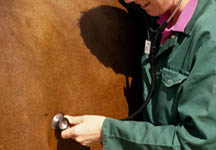Two horses kept on the same premises in Devon as a horse that was diagnosed with EIA (swamp fever) last weekend have tested negative for the deadly disease.
Defra has said this afternoon that the horses remain healthy, but will be kept on the premises and tested again in 90 days.
Restrictions will remain in place during those 90 days.
Defra’s chief veterinary officer Nigel Gibbens said: “Minismising the risk of spread has been Defra’s primary concern from the outset.
“Our assessment is that the risk [of EIA transmission] is very low, as the horse [that was destroyed at the weekend] had only recently become ill.”
Local horse owners have reacted with anger that Defra has not named the yard at which the horse infected with equine infectious anaemia (known as EIA or swamp fever). A bridleway is believed to run beside the property.
Neighbours also believe biosecurity measures and Defra’s efforts to trace horses the sick animal came into contact with have been inadequate.
But Defra chef veterinary officer Nigel Gibbens said: “[From the time the horse became ill], it presented a risk of spread only to other horses kept within 200 metres — biting flies are very unlikely to fly further than this.
“We have been checking other horses in the area and will contact any owners that we identify.”
Another horse in Northumberland tested positive for EIA last week, but Defra says the two cases are not being linked.
Earlier this year, a yard in Wiltshire was quarantined after a horse tested positive for EIA shortly after being imported into the UK.
All the cases have occurred in horses that have come from Romania via either Belgium or The Netherlands.





